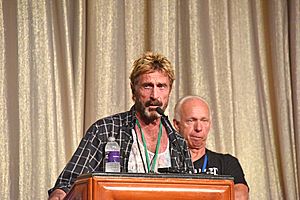John McAfee facts for kids
Quick facts for kids
John McAfee
|
|
|---|---|

McAfee at Politicon in 2016
|
|
| Born |
John David McAfee
18 September 1945 Cinderford, Gloucestershire, England
|
| Died | 23 June 2021 (aged 75) Sant Esteve Sesrovires, Catalonia, Spain
|
| Nationality |
|
| Education | Roanoke College (BA) |
| Occupation |
|
| Known for | Founder of McAfee Corp. |
| Political party | Libertarian (before 2015, 2016–2021) |
| Spouse(s) |
|
John David McAfee (born September 18, 1945 – died June 23, 2021) was a British-American computer expert and businessman. He became famous in 1987 for creating the first commercial anti-virus software. He also founded a company called McAfee Associates to sell his new software.
Later in his life, John McAfee became a strong critic of the company he started. He even told people to remove its anti-virus software from their computers. He also ran for president of the United States twice, in 2016 and 2020, as a candidate for the Libertarian Party.
McAfee lived in Belize for several years. He returned to the United States in 2013. In 2020, he was arrested in Spain due to financial issues. He died in a Spanish prison in 2021, shortly after a court decided he could be sent to the U.S.
Contents
John McAfee's Early Life and Education
John McAfee was born in Cinderford, England, on September 18, 1945. His father was an American soldier, and his mother was British. He grew up mostly in Salem, Virginia, in the United States. When he was 15, his father passed away.
In 1967, McAfee earned a bachelor's degree in mathematics from Roanoke College in Virginia. Years later, in 2008, the college gave him an honorary science degree. He started working towards a higher degree in mathematics but left college around 1968.
John McAfee's Career and Businesses
John McAfee had a long and interesting career in technology. He worked for several important companies before starting his own.
Working at NASA and Other Tech Companies
From 1968 to 1970, McAfee worked as a programmer for NASA in New York City. He helped with the Apollo program, which sent humans to the Moon. After NASA, he worked as a software designer at Univac and then as an operating system architect at Xerox.
In 1978, he became a software consultant for Computer Sciences Corporation. He also worked for a consulting firm called Booz Allen Hamilton from 1980 to 1982.
Creating McAfee Associates and Antivirus Software
In 1986, while working at Lockheed, John McAfee learned about the "Brain" computer virus. This virus was made for personal computers, and he found it very concerning. He saw a chance to help people and decided to create software that could find and remove computer viruses automatically.
In 1987, McAfee started McAfee Associates Inc. to sell his new software, which he called VirusScan. This was the very first anti-virus software sold to the public. It was also one of the first software products to be shared widely over the Internet.
At first, McAfee wanted to make people aware of computer viruses. But by making people understand the danger, he sold millions of copies. By 1990, his company was earning a lot of money. The company became a public company in 1992. In 1993, McAfee stepped down as the main leader but stayed as a technical officer. He sold his remaining share in the company in 1994 and was no longer involved in its daily work.
Years later, Intel bought McAfee Associates in 2010. In 2014, Intel changed the name of McAfee products to Intel Security. John McAfee was happy about this, saying he was "grateful to Intel for freeing me from this terrible association." However, the business later separated from Intel and went back to being called McAfee.
Other Ventures and Interests
After leaving McAfee Associates, John McAfee started other businesses.
- He founded Tribal Voice, which created one of the first instant messaging programs called PowWow.
- In the 2000s, he became interested in and promoted ultra-light flights, calling them aerotrekking.
- In 2010, McAfee started a company called QuorumEx in Belize. This company aimed to create herbal antibiotics.
- In 2013, he founded Future Tense Central, which worked on a secure computer network device.
- He also developed a smartphone app called Cognizant (later DCentral 1) that showed what permissions other apps on your phone were using.
At a technology conference in 2014, McAfee warned people about using smartphones. He suggested that many apps could be used to spy on users who don't read privacy agreements. In 2016, he became a leader at a security startup called Everykey.
In 2016, McAfee offered to help decrypt an iPhone used in a famous case, saying he could do it easily. He later said this was a way to get attention, but he still believed it was possible.
He also became the head of MGT Capital Investments, a technology company. He changed its focus from social games to cybersecurity. He believed that traditional anti-virus software was no longer enough. He also moved MGT into mining cryptocurrencies like Bitcoin. He left MGT in 2018 to focus on cryptocurrencies. In 2018, he also became the CEO of Luxcore, another cryptocurrency company.
John McAfee's Political Journey
John McAfee was a libertarian. This means he believed in less government involvement in people's lives and in the economy. He supported ideas like:
- Not getting involved in foreign wars.
- A free market economy where wealth is not redistributed.
- Upholding free trade.
- Getting rid of the Transportation Security Administration.
He also believed in religious liberty, meaning business owners should be able to refuse service if it goes against their religious beliefs. He argued that if you're not harming anyone, you should have the freedom to choose.
Running for President in 2016
On September 8, 2015, John McAfee announced he would run for president of the United States in the 2016 election. He first said he would run for a new party called the Cyber Party. But later, he decided to seek the nomination from the Libertarian Party. He was one of the top candidates for the party. He came in second in the party's primary elections.
Running for President in 2020
In 2018, John McAfee tweeted that he would run for president again in 2020. He chose to run as a Libertarian once more. His main focus during this campaign was promoting wider use of cryptocurrency.
In 2019, he tweeted that he would continue his campaign "in exile" due to reports of financial issues. He said he was in "international waters." He also supported Che Guevara on Twitter, which caused some disagreement with other Libertarians. He later suspended and then restarted his campaign. He eventually lost the Libertarian Party nomination in 2020.
John McAfee's Personal Life
John McAfee was married three times. His first wife was Fran, whom he met around 1968. He married his second wife, Judy, around 1987, and they divorced in 2002. In 2013, he married Janice Dyson. The couple moved to Portland, Oregon, in 2013.
McAfee once said that creating the first commercial antivirus program made him a target for hackers. To protect himself, he had other people buy his computer equipment and used fake names for setting up computers. He also changed his IP address many times a day. When asked if he used McAfee's antivirus software himself, he said he took it off because it was "too annoying."
John McAfee's Passing
On June 23, 2021, John McAfee was found dead in his prison cell near Barcelona, Spain. This happened just hours after a Spanish court approved his extradition to the United States for financial issues.
John McAfee in the Media
John McAfee's life has been featured in several documentaries and films:
- Gringo: The Dangerous Life of John McAfee is a documentary from 2016 about his time in Belize.
- A film about McAfee called King of the Jungle has been planned, with different actors considered for the main roles.
- In 2017, McAfee and his wife were interviewed on the TV show 20/20.
- The 2022 Netflix documentary Running With the Devil: The Wild World of John McAfee includes footage and interviews about his life.
Books by John McAfee
- Computer Viruses, Worms, Data Diddlers, Killer Programs, and Other Threats to Your System. What They Are, How They Work, and How to Defend Your PC, Mac, or Mainframe, (with Colin Haynes) 1989
- The Secret of the Yamas: Spiritual Guide to Yoga, 2001
- The Fabric of Self: Meditations on Vanity and Love, 2001
- Into the Heart of Truth, 2001
- Beyond the Siddhis. Supernatural Powers and the Sutras of Patanjali, 2001
Images for kids
See also
 In Spanish: John McAfee para niños
In Spanish: John McAfee para niños
 | Mary Eliza Mahoney |
 | Susie King Taylor |
 | Ida Gray |
 | Eliza Ann Grier |







